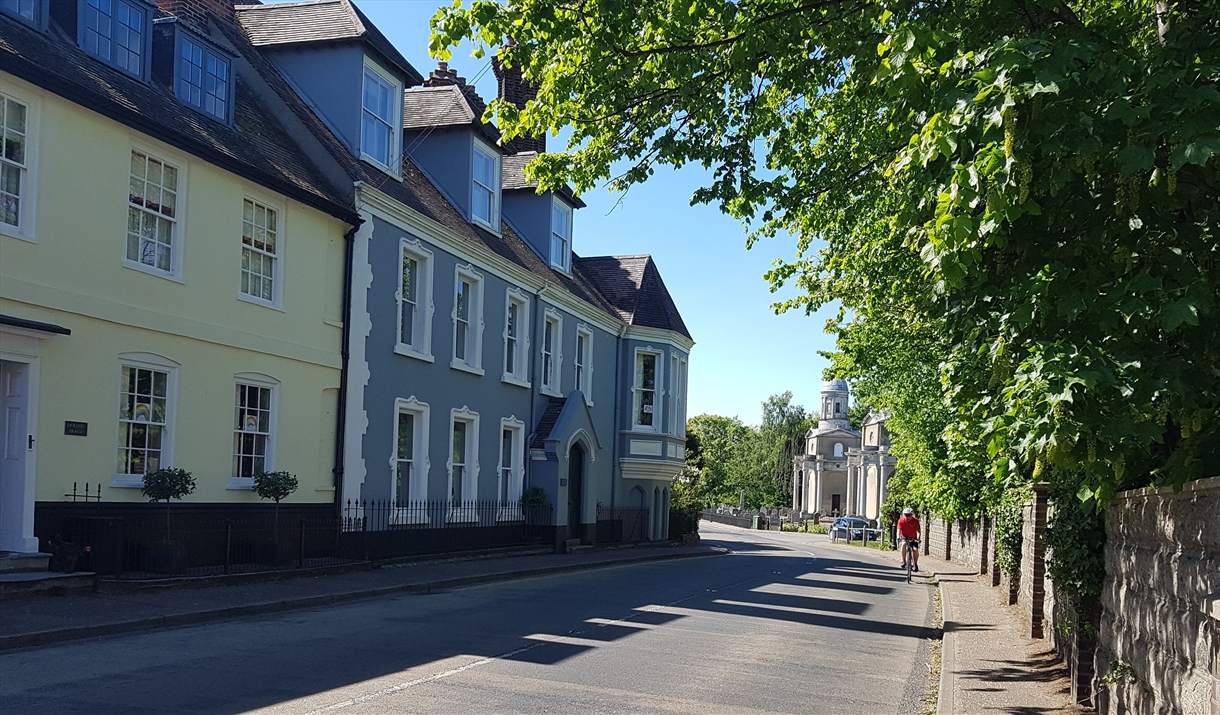Book Tickets Online
About
This short walk on the Stour Estuary between Essex and Suffolk is inspired by the 17th century East Anglian witch trials. During this dark period of English history, around 300 people were tried for witchcraft and close to 100 executed as ‘witches’.
Be sure to explore Mistley Towers as you pass. If you get hungry along the way, enjoy delicious food at The Mistley Thorn restaurant or Lucca Enoteca. For full details and map, download the PDF. Summary below:
The run-down building opposite was once the White Hart Pub. It dates back to at least the 17th century and according to local legend is one of the inns where ‘witchfinders’ Matthew Hopkins and John Stearne met with local accusers to plan their persecutions. Though referred to as ‘witchfinders’, this wasn’t by any means an official role. The title ‘witchfinder general’, with its military associations, was created by Hopkins himself as an act of self-aggrandisement.
Walk along the High Street for a short while, then take a right at South Street. Stop on the small green at the top of the hill.
Surrounded by large, well-kept Georgian houses and high up on a hill, today South Street is one of Manningtree’s most desirable streets. Yet it was here on July 18th 1645 that four local women were hanged for the crime of witchcraft. Their names were: Anne West of Lawford, Helen Clark of Manningtree, Marian Hocket from Ramsey and Anne Cooper from Great Clacton. According to historical records, 92 witnesses testified against these women and 15 others during their trial.
Walk back down to the High Street, turn right and stop outside the hairdressers at no 42.
This old brick wall next to the hairdressers would be easy to miss. But look up and you’ll see a plaque fixed to the brickwork which reads: ‘Site of the church of St Michaels and All Angels 1616-1966’. The buttress wall is all that remains of Manningtree’s church; the same church where the local community: accusers and accused, watchers and searchers, witchfinders and prosecutors would have met for regular worship. It’s also where the self-styled ‘witchfinder general’ Matthew Hopkins’ stepfather, the rector of Mistley and Manningtree, preached his sermons to a largely pious crowd.
Continue along the High Street bearing left to reach The Walls, with the River Stour on your left, stopping when you reach a bridge on the left over a lake.
This brick wall is what remains of the Hopping Bridge. The bridge itself wouldn’t have been here during the period of the witch trials as it wasn’t built until the 18th century, but bodies of water like this one were used to test the guilt or innocence of suspected witches by a process known as ‘swimming’.
Continue on the road past the Hopping Bridge and passing the Mistley Towers to reach Mistley Quay. Turn right at the large industrial building (a maltings) and follow the Essex Way signs over a railway bridge. Follow the footpath across a field and at the second T-junction of footpaths turn left towards the woods. Take the path bearing left to walk down to the pond.
The ghost of Matthew Hopkins, in full 17th century costume, is said to haunt Mistley Pond. This could very well be more colourful, local legend, but ghosts are sometimes said to haunt lakes, pools and rivers, suggesting that water acts as a portal between the living and the dead.
Retrace your steps back to the main path then follow it uphill to reach an ancient oak tree with a half trunk in the woods.
Known as Old Knobbley, this ancient, gnarled oak tree is thought to be around 800 years old. Over the centuries it has born witness to wars, famines, even a mini Ice Age as well, of course, as the 17th century witch hunts.
Follow the path ahead past Old Knobbley to reach the edge of the field. You can continue into the field to find the site of the church where Matthew Hopkins is buried, though there is nothing to see now.
The path back to Manningtree is part of the Essex Way and this section is an ancient trackway connecting the village to nearby Mistley. It passes the site of St Mary’s Church at Mistley Heath, where Matthew Hopkins is buried. It’s hard to imagine now as nothing remains of the church or its graveyard today, its flint and rubble ruins totally overgrown.
Take the path back passing Old Knobbley to leave the forest and reach the field track. Instead of taking the path right (back across the railway bridge and Mistley), continue ahead following a gravel track passing large houses. At a crossroads, turn left then take a footpath right towards Manningtree. Cross a road and take the footpath opposite between houses. Turn right to cross the railway line and continue along Brook Street to reach the High Street where we started.
The walk was produced in collaboration with the artist Susan Pui San Lok and is part of a project called A Coven, a Grove, a Stand, a body of work commissioned by Firstsite as part of New Geographies.
Book Tickets
Facilities
Catering
- On-site catering - Why not stop off at Lucca Enoteca or The Mistley Thorn Restaurant
- On-site light refreshments
Site Features
- English Heritage Property - Mistley Towers en route
Map & Directions
Road Directions
Parking available in High Street or surrounding streets.
Public Transport Directions
Manningtree Train Station.



 next to an item to add it to your Itinerary basket. You will then be able to save, download, or share your itinerary.
next to an item to add it to your Itinerary basket. You will then be able to save, download, or share your itinerary.












